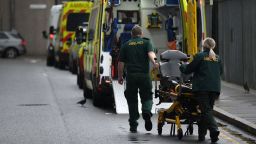British nurses and ambulance drivers will press on with more strikes in a dispute over pay after talks with the government failed to produce a breakthrough on Monday.
The Royal College of Nursing (RCN), which represents close to half a million nurses, midwives and health care assistants described the talks as “bitterly disappointing.”
“There is no resolution to our dispute yet in sight,” Joanne Galbraith-Marten, the RCN’s director of employee relations and legal services, said in a statement. “This intransigence is letting patients down. Ministers have a distance to travel to avert next week’s nurses strike,” she added.
After resisting union calls for direct talks with the government on pay for months, Prime Minister Rishi Sunak opened the door in a last ditch effort to end the worst wave of industrial action the United Kingdom has seen for many years.
Going into the talks, health care unions had warned that strikes set for later this month would go ahead unless the government increases pay for the current financial year to April 2023.
In an interview with the BBC on Sunday, Sunak didn’t rule out addressing this year’s pay for nurses and other National Health Service (NHS) workers. RCN general secretary Pat Cullen later told the public broadcaster that his remarks offered “a chink of optimism.”
But Galbraith-Marten said Monday that the government was unwilling to offer more money for the current financial year and that it insisted “‘the budget is already set’ for next year.”
The RCN is planning strikes for January 18 and 19.
Meanwhile, 10,000 ambulance staff will strike as planned on Wednesday after talks with health minister, Steve Barclay, yielded no significant progress, according to the GMB union.
“Today’s talks fell well short of anything substantial that could stop this week’s strikes,” GMB national secretary Rachel Harrison said in a statement. “There was some engagement on pay — but not a concrete offer that could resolve this dispute and make significant progress on the recruitment and retention crisis.”
Health Secretary Steve Barclay said during the meeting that the government would welcome input from unions “into the independent pay review process for 2023/24 and what is affordable,” according to a statement from his department.
Barclay had requested “further discussions on ideas to make the health service work better … that could unlock additional funding,” adding he was “keen to continue a dialogue on this in the coming days as we all want to see a resolution,” the statement added.
In addition to the talks with health care unions, government officials also met with unions representing railway workers and teachers.
Workers are demanding higher pay and better working conditions in the face of record inflation and a sharp fall in living standards.
The typical British household will be £2,100 ($2,500) poorer over the two years to April 2024 because of higher inflation and taxation, as well as rising energy bills and mortgage costs, according to research published Monday by the Resolution Foundation, a think tank.
“Britain is only at the mid-point of a two-year income squeeze,” Resolution Foundation researcher Lalitha Try said in a statement.
Ahead of Monday’s talks, Sharon Graham, the leader of Unite, which also represents ambulance drivers, said Sunak “knows very well that there can be no progress on the upcoming (2023/4) NHS pay review while the current 2022 NHS pay claim remains unresolved.”
“I repeat that unless and until he accepts the need to make real progress on the current pay claim, there will still be strikes across the NHS this winter,” she said in a statement.
Sara Gorton, head of health at Unison, which represents other NHS workers, said that “a firm commitment to boost wages for what’s left of the current year would mean unions may call off the strikes.”
CNN has reached out to Unison and Unite for comment on the talks. Some 2,600 Unite ambulance workers have planned to strike on January 19 in Wales and on January 23 in England.
Other unions are also gearing up for fresh industrial action. Teacher unions are balloting members over a possible strike, while the British Medical Association started balloting junior doctors on Monday.
Monday’s talks between unions and ministers come after the government proposed legislation last week that will make it harder for some workers to strike. Unions have criticized the new law, which will force workers in fire, ambulance and rail services to maintain a basic level of service during strike action or risk dismissal.










